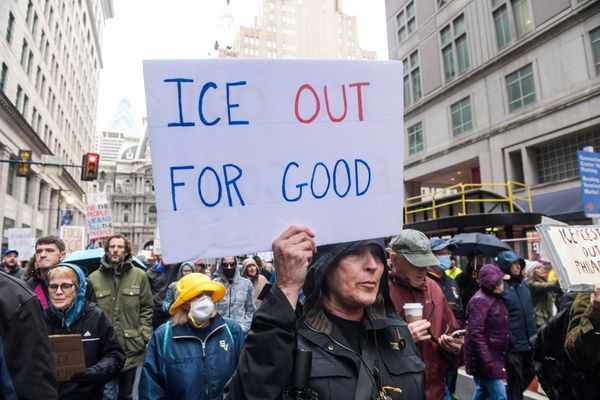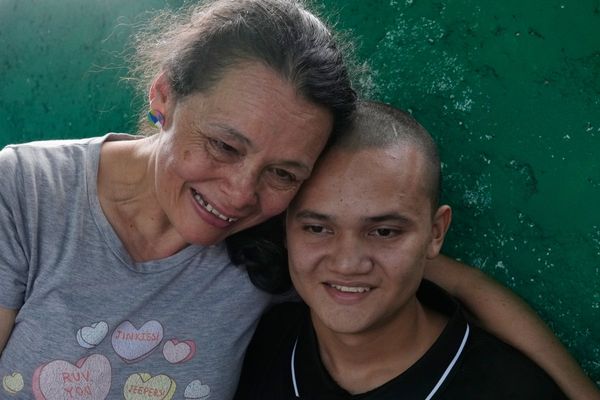
The city of Atlanta has refused to begin counting and verifying petitions signed by about 116,000 registered voters to put on the ballot the question of whether a controversial police and fire department training center known as “Cop City” should be built.
The move was backed by a legal memo from lawyers hired by the city, citing an active court case, after dozens of activists and Atlanta residents delivered the petitions to the clerk’s office at city hall on Monday.
At stake is the question of when Atlanta residents could vote on the Cop City project if enough signatures are verified. Meanwhile, work on the project continues apace, resulting in clear-cutting, and eventually, cement being poured on a 171-acre footprint in the South River forest, south-east of Atlanta.
The training center would be the largest of its kind in the US, according to a recent legal filing by the state of Georgia. It has been the subject of a broad-based movement opposed to the idea now in its third year.
The city’s move surprised activists and at least one member of the city council, Liliana Bakhtiari, whose district is one of two closest to the forest – and who said she had not been told of the city’s decision beforehand.
“I’m livid,” Bakhtiari said. “How can we expect people to have any faith in the democratic process when they keep moving the goalposts?”
Monday’s memo continued months of roadblocks put up by the city, a jarring litany by mostly Democratic officials that observers say are undemocratic and will jam the process of letting voters decide on such a major project.
The city’s approach, rendering the process more difficult, “is part of a broader trend we’re seeing across the country, where those in power are trying to stop ballot initiatives”, said Emma O Sharkey, with the Elias Law Group, a voting rights firm.
In the nearly 12 weeks since the referendum was launched, Atlanta has been “throwing everything to see what sticks”, Sharkey said – including the notion of matching voter signatures on the petitions to previous signatures on file. This type of process has been found unconstitutional in litigation elsewhere and led referendum organizers last week to write a letter to Atlanta’s Carter Center, asking it to monitor the city’s handling of the petitions.
Other obstacles from the city to date include: delaying or denying approval of the petition’s format three times in two weeks at the outset due to minor issues such as including a line for witnesses to sign – giving organizers less time to gather the signatures needed to get the question on the ballot for a November election; and, more recently, a legal appeal by the city to a federal court’s decision allowing people from neighboring DeKalb county to gather signatures for the petition, even though they can’t sign it and can’t vote on the question.
This is the court case referred to in Monday’s memo.
Organizers wanted to include DeKalb county residents in the canvassing effort gathering signatures because, although Cop City is planned on forested land the city owns, it happens to be located in the county. Due to the city’s ownership, only Atlanta voters will actually be able to vote if the campaign is successful in putting the question on the ballot.
The city has 50 days to review the signatures. The court case around who can gather signatures to put a question on a ballot could affect the outcome of the entire effort.
Meanwhile, the city is spending taxpayer money on this and other legal measures against the referendum – nearly $150,000 on outside attorneys in the months of June and July alone, according to an open records request filed by the Guardian.
The number of signatures delivered Monday is nearly twice the number needed – 58,231, or 15% of active, registered Atlanta voters – since it is anticipated that the city will disqualify a large number for various reasons.
Some sort of signature verification process could be one of those reasons. It is unclear exactly what version of this process will be used, as the city has been less than transparent in explaining the details. Doug Shipman, Atlanta city council president, told the Guardian recently that he didn’t understand the city clerk’s process to verify signatures – even though it is the council that hired outside counsel for the referendum.
Sharkey said that using previous signatures to verify a voter’s identity has been litigated before – including in Georgia – and that case law “shows this places a burden on people’s right to vote”, because certain groups, including disabled, older and Black and Latino voters, “are more likely to have variations in their signatures”.
It is the first referendum in the city’s 186-year history, although statewide referendums are relatively common in other parts of the US – particularly the west.
But the continuing opposition from the city could influence efforts elsewhere, especially in the south, Sharkey said. “Since we haven’t seen as many referendums in the south, this could dissuade activists in other places from trying to use this mechanism to make change. That would be a shame.”







